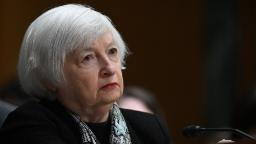[ad_1]

CNN
—
Markets seesawed severely this week when two of the US economy’s most prominent leaders gave seemingly contradictory statements on the health of the banking sector. Expect more turbulence ahead.
Fresh off of the Federal Reserve’s decision on Wednesday to hike interest rates by a quarter point, Fed Chairman Jerome Powell said in the central bank’s post-meeting press conference that “all depositors’ savings are safe.”
But elsewhere in Washington D.C., Treasury Secretary Janet Yellen testified Wednesday before a Congressional committee that she wasn’t considering a guarantee of all deposits.
A day later, Yellen said in something of a reversal that the federal government is ready to take more action to stop bank contagion if necessary to curb systemic risk.
The apparent disconnect baffled Wall Street investors, who for weeks have been searching for clues about the state of the banking sector and what the crisis means for the Fed in its fight against inflation.
“It kind of reeks of a lack of leadership from the people we need leadership from,” says Matthew Tuttle, CEO and CIO of Tuttle Capital Management. “They’ve got to get their story straight.”
By week’s end, the stock market emerged relatively resilient, with all three major indexes posting gains. The benchmark S&P 500 fell about 1.7% Wednesday. On Thursday, the index gained as much as 1.8% before paring back its gains to 0.3%. The broad-based index rose about 0.6% on Friday and finished the week up 1.4%.
This resilience is driven partly by the Fed’s signaling that it will pause interest rate hikes later this year. But the evolving banking crisis makes it unclear if the central bank’s best-laid plans will pan out.
And, going forward, the banking turmoil is just one factor to consider when thinking about how markets will act. The fed’s still waging its war against inflation, and while the economy seems robust now, that’s not guaranteed to stay true.
Already, investors have sought alternative spaces for their cash as the market churns. Bitcoin has jumped in recent weeks. Money market indexes, thought to be one of the safest and lowest-risk investment options, have seen a huge influx of cash. Gold, another perceived haven, has climbed – and will likely continue to see upside.
And the Fed’s rate hikes will continue to punish the financial sector.
The tumult in the banking sector is an outcome of the central bank’s fight against inflation, says José Torres, senior economist at Interactive Brokers and former economist at the FDIC. “There has to be some economic pain on the other side, and I think that’s what’s going on with these financial institutions,” he said. He added that additional bank failures – a common feature of recessions – could be coming.
“Banks that had poor risk management strategies, some of those are going to have to go under because the Fed has an important mandate that it’s trying to take care of right now, which is to control inflation,” Torres said.
Markets likely aren’t headed for a crash, investment experts said. Stocks will likely be stuck trading in a range until either the Fed or traders wave the white flag in their “game of chicken” – in other words, either the central bank says it made a mistake and needs to pivot, or traders believe the economy will tank and start selling, says Tuttle. “I don’t think we’re at either one of those things yet.”
More pain is likely ahead for the equity market, says Liz Young, head of investment strategy at SoFi Technologies.
“As we’ve seen over many historical cycles, once the economic data turns, it’s kind of the last thing before we confirm a recession. And I do expect the economic data to turn in coming months,” Young said.
Economy experts say the US is likely headed for a slowdown this year as the Fed continues waging war against inflation – even as the battle will result in “real costs” like rising unemployment rates. And while containing the banking turmoil will be important for markets and the economy, it’s only one part of a complex equation.
To be sure, it’s unclear how the banking sector will hold up, especially as a slide in shares of Deutsche Bank on Friday adds to global concerns. Wall Street will be watching.
[ad_2]
Source link










